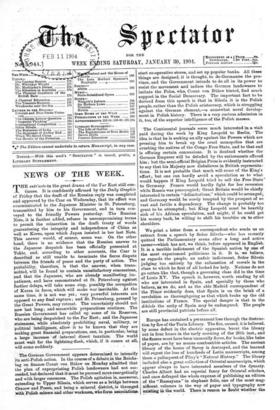The German Government appears determined to intensify its anti-Polish action.
In the coarse of a debate in the Reichs- tag on finance Count von Billow on Monday admitted that the plan of expropriating Polish landowners had not suc- ceeded, but declared that it must be pursued more energetically and with larger resources. The Polish agitation is, moreover, extending to Upper Silesia, which serves as a bridge between Cracow and Posen, and being a mineral district, is thronged with Polish miners and other workmen, who form associations,
start co-operative stores, and set up popular banks. All these things are designed, it is thought, to de-Germanise the pro- vince, and the Government intends to do all in its power to resist the movement and induce the German landowners to imitate the Poles, who, Count von Billow hinted, find much support in the Social Democracy. The important fact to be derived from this speech is that in Silesia it is the Polish people, rather than the Polish aristocracy, which is struggling against the German element,—a somewhat novel develop- ment in Polish history. There is a very curious admission in it, too, of the superior intelligence of the Polish masses.






















































 Previous page
Previous page